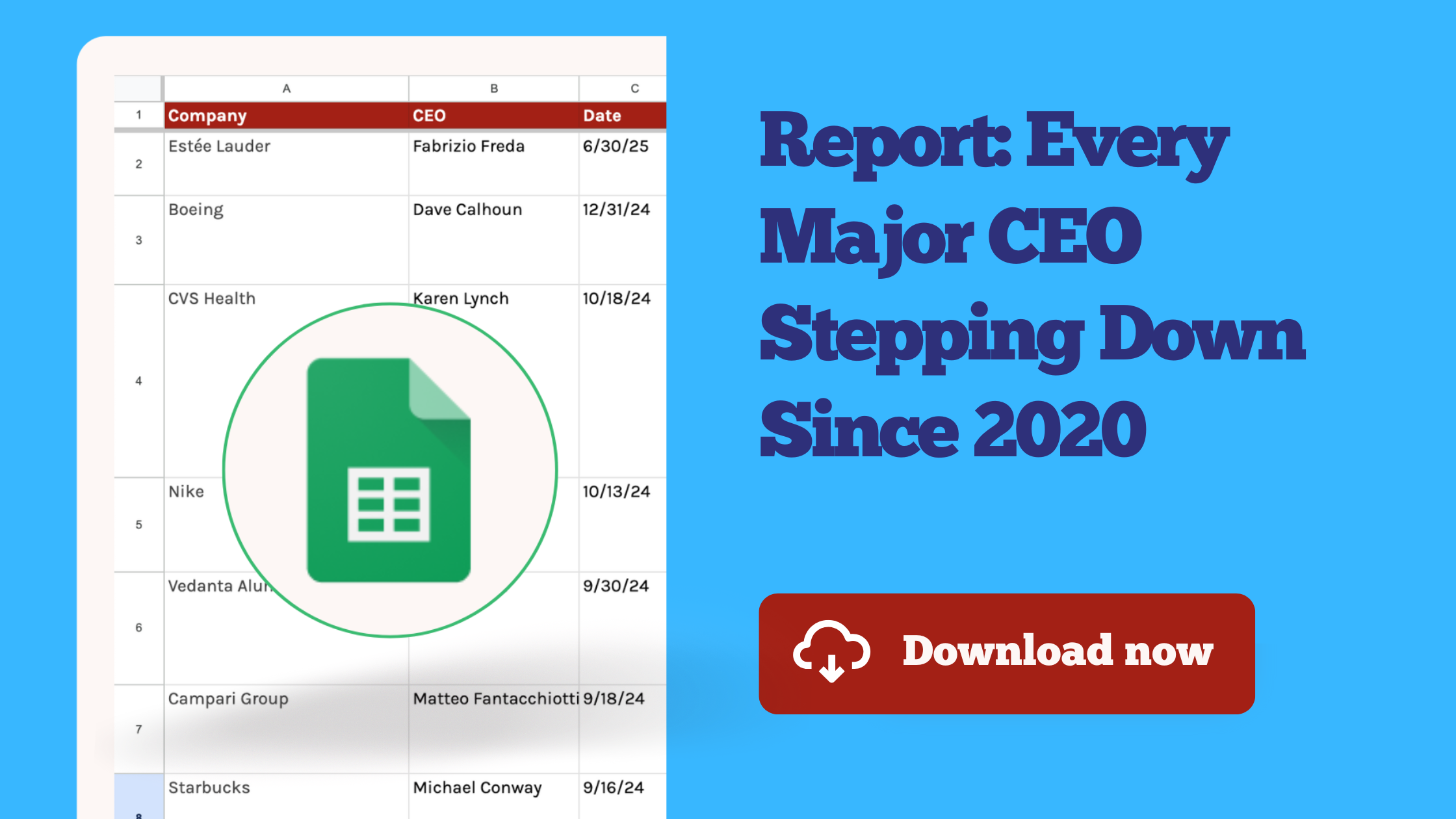Every Major CEO Stepping Down: 2020-2025
CEOs are stepping down at record-high rates.
According to a report from Russell Reynolds Associates, a record 202 CEOs of publicly traded companies exited their roles in 2024. This tracks with research by Challenger, Gray & Christmas, Inc.: “So far this year, [as of Dec 10, 2024] a record number of CEOs have left their roles.”
Through our own primary research at Buildremote, we uncovered that 48 of the Fortune 100 have had a CEO step down since 2020.
In this report, you’ll find every notable CEO stepping down since 2020. We looked at all Fortune 100 companies plus every other CEO exit at companies with 1,000+ employees.
205 Major CEOs Have Stepped Down Since 2020
Here are a few notable CEOs who stepped down since 2024. The full list can be accessed here.
Or, access a sample of the database first.
Company | CEO | Date | |
 X (Twitter) | Linda Yaccarino | 7/9/25 | “Linda Yaccarino, CEO of Elon Musk’s social media platform X, has announced she is stepping down after two years in the role. Yaccarino did not give a reason for her departure." |
 Yum! Brands | David Gibbs | 2026 | "After six years helming the company, Yum Brands CEO David Gibbs announced Monday he plans to retire in the first quarter of 2026." (source) |
 WPP | Mark Read | 12/31/2025 | "Mark Read, Chief Executive Officer (CEO), will retire from the Board and as CEO on 31 December 2025. After more than 30 years with the Company, including seven as CEO, Mark has decided that the time is right for him to hand over to a new leader and the search for a successor is underway." (source) |
 Harley Davidson | Jochen Zeitz | 2025 | "Harley-Davidson announced that Chairman, President, and CEO Jochen Zeitz is retiring. Zeitz will remain as CEO until his successor is in place." (source) |
 Six Senses | Neil Jacob | 6/30/25 | "Neil Jacobs, CEO of ultra-luxury resort brand Six Senses, said he's stepping down after 13 years of leading the brand through a major expansion and its pre-pandemic acquisition by IHG (InterContinental Hotels Group)." (source) |
 Sonder | Francis Davidson | 6/25/25 | "Sonder co-founder Francis Davidson stepped down from his role as CEO of the company. Davidson will also give up his position as a member of the company’s board of directors." (source) |
 Indeed | Chris Hyams | 6/2/25 | "After nearly 15 years of helping people get jobs, I’ve made the decision to leave Indeed. [...] Effective today, Deko returns as CEO of Indeed. [...] I’ll remain on as a Board advisor through the end of 2025 to support the transition," wrote Chris Hyams in the note he shared with the team. (source) |
 CBS News | Wendy McMahon | 5/19/25 | "The head of CBS News stepped down Monday, marking the second high-profile departure from the organization within the past month as its parent company contends with a $20 billion lawsuit from President Donald Trump and an $8 billion merger." (source) |
 UnitedHealth Group | Andrew Witty | 5/13/25 | "UnitedHealth Group said Chief Executive Andrew Witty stepped down for “personal reasons” after presiding over a punishing period for the company, including a steep drop in its shares after its quarterly earnings last month fell significantly short of investors’ expectations. Effectively immediately, Chairman Stephen Hemsley will return to running the healthcare giant he helped build." (source) |
 Spirit Airlines | Ted Christie | 4/7/25 | "Ted Christie, CEO of Spirit Airlines, is stepping down from his role leading the embattled carrier. A group of several company executives — Chief Financial Officer Fred Cromer, Chief Operating Officer John Bendoraitis and General Counsel Thomas Canfield — has been tapped to lead the airline until a successor is found." (source) |
 Amtrak | Stephen Gardner | 3/19/25 | "Amtrak CEO Stephen Gardner is stepping down from his position to “to ensure that Amtrak continues to enjoy the full faith and confidence of this administration.” The decision comes as Department of Government Efficiency (DOGE) head Elon Musk said he believes the US Postal Service and Amtrak need to be privatized." (source) |
 Kroger | Rodney McMullen | 3/3/25 | "The Kroger Co. today announced that Chairman and Chief Executive Officer Rodney McMullen has resigned from the Company following a Board investigation of his personal conduct that, while unrelated to the business, was inconsistent with Kroger's Policy on Business Ethics." (source) |
 Unilever | Hein Schumacher | 2/25/25 | "Unilever's Hein Schumacher is stepping down as chief executive — just two years into the role — to be replaced by chief financial officer Fernando Fernandez." |
 Panera Breads | Dave Calhoun | 1/7/25 | |
 Boeing | José Alberto Dueñas | 12/31/24 | |
 Subway | John Chidsey | 12/31/24 | "Subway announced Tuesday that its CEO, John Chidsey, will retire at the end of 2024. Executive Carrie Walsh will replace him as interim CEO." |
 Intel | Pat Gelsinger | 12/2/24 | "Gelsinger, who joined Intel in 1979, was "forced out" after the board lost confidence in his plan to revive the struggling chipmaker." |
 CVS Health Corp | Karen Lynch | 10/18/24 | |
 Nike | John Donahoe | 10/13/24 | |
 Starbucks | Michael Conway | 9/16/24 | |
 Chipotle | Brian Niccol | 8/31/24 | |
 Nestlé | Mark Schneider | 8/31/24 | |
 Amazon Web Services | Adam Selipsky | 6/3/24 | |
 Discover Financial | Michael Rhodes | 4/1/24 | |
 Morgan Stanley | James Gorman | 1/17/24 | |
 JetBlue | Robin Hayes | 01/08/2024 | |
 Costco | Craig Jelinek | 1/1/24 | |
What does it mean if a CEO steps down?
Just so we’re all on the same page, here is how we define a CEO stepping down – the leader of a company gives up his or her position for any number of reasons like retirement, resignation, contract ending, switching to a new role, etc.
Additional workplace trend tracking
At Buildremote, we like to identify and then track workplace trends exhaustively. We commit to being the reliable source for anything happening in the way work gets done. Here are a few other reports you may find interesting:
- We reported a staggering amount of well-known companies going remote
- Then the companies going hybrid rolled in
- Then the companies switching to a four-day work week
- We analyzed in-depth the true plans for the Fortune 100’s return to office
- We reported on every major company reducing office space
Things are changing quickly in the workplace. Stay on top of it all by subscribing to Buildremote’s bite-sized emails. We only email you when we have something interesting, not every day.


thank you for following this. The last list I saw they have not updated in a long time!
Thank you! I feel it’s important to have an up to date list as I firmly believe there is more than what meets the eye about these CEOs stepping down.
You are absolutely correct or telepathic. Alot of corruption being dealt w behind the scenes since 2020. all comes to light soon. There are people doing the good work for humanity for a better tomorrow. Look for my comment here in a few days after they approve my comment.
All will come to light very soon.
The cause of all the CEOs resigning IS NOT a coincidence, it’s was due to the fact that they were….(well. the majority of them) were caught up in some very deviant crimes and had no choice but to quit ,resign or be prosecuted. Soon you will hear the cause n reasons for their vast departures and it’s not random. They had to cooperate n quit or face jail time. This knowledge will all be exposed very soon. There have been operations going on behind the scenes since 2020 and are just now recently almost done with doing the good work for humanity. Just know this n think… If u play .. you better know…ur gonna pay. All secrets will come to light. No secrets will be kept quiet any longer. It must all come into the light now.
There’s alot of corruption being dealt with behind the scenes n in the skies …all to benefit humanity for a better tomorrow.